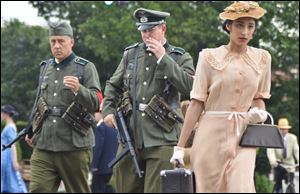
Docudrama builds a case for compassion
3/29/2014
Grace Srinivasan, right, plays the title role in ‘Enemy of the Reich: The Noor Inayat Khan Story.’
Four weeks before events celebrating greater Toledo’s recognition as a compassionate region by the Compassionate Action Network International on April 25-27, a free screening Sunday of a docudrama set during World War II illustrates compassion, and one of its executive producers has a direct tie to the compassion movement.
Enemy of the Reich: The Noor Inayat Khan Story is about a Muslim woman, the daughter of a father from India and a mother from the United States, who served the Allies from Nazi-occupied Paris during World War II as an undercover radio operator on a mission, part of Winston Churchill’s Special Operations Executive. It will be shown at the Toledo Museum of Art Peristyle, 2445 Monroe St. The event is from 1 to 5 p.m., with the film starting at 2 p.m.
“It’s actually a story of an individual looking further and further and further out into her community and seeing a need that continued where other people would have fled,” said Michael Wolfe, an executive producer of the film, who will speak at the screening. “Over a million people had fled within weeks,” but Noor Khan, “in perhaps the most dangerous occupation, that of the wireless operator,” a role with a life expectancy of about six weeks, Mr. Wolfe said, continued her mission after the group of resistance fighters she served with was broken in 1943.
“She could help to rebuild this network and make some further value of their sacrifice by staying on,” Mr. Wolfe said. “So her compassion was enormous. She was arranging the munitions drops for resistance fighters by telegraph for a long time, the only one in Paris for a long time, and arranging the escape of downed American pilots.”
Noor Khan’s father was a Sufi religious teacher and musician, a Muslim, in Paris “who had many students and devotees and wrote many books,” Mr. Wolfe said. “There was a steady stream of students and a very organized religious or faith curriculum. She was her father’s first child, and her respect for him and her worldview derived directly from him, so her respect was very great even after he died [when she was 13]. She felt his presence, she felt a part of his being, and his teaching both created a very powerful idealism in her and also a very powerful sense of service. So when the Germans marched in, everything the Nazi Party stood for, she was in direct opposition to.”
When the family fled to England in 1940, she and other family members immediately volunteered to assist the Allied powers—“even though at this time the British were in what seemed to be a deadlock grip with India [over its fight for independence], from which her father came.” Even her great-great-great grandfather, the “Tiger of Mysore” Tipu Sultan, fought British colonialism as the head of the last independent state in India—the same time George Washington was fighting Britain in America, Mr. Wolfe said. In World War II, Noor Inayat Khan’s fight was on Britain’s side.
She was captured in Paris, imprisoned in Germany, and executed at the Dachau concentration camp; she never cooperated with the Nazis.
Produced by the Unity Productions Foundation, a nonprofit organization that uses the slogan “Working for Peace through the Media,” Enemy of the Reich will be shown on PBS later this year, the hundredth anniversary of Noor Khan’s birth. Grace Srinivasan plays Noor Khan, and the film is narrated by Helen Mirren. Michael Wolfe and Alex Kronemer are the executive producers. Though not rated, there are some scenes of violence in the film.
Besides presenting a story illustrating Noor Khan’s compassion, Mr. Wolfe, an Ohio native, recently joined the Global Compassion Council, the governing body for the Charter for Compassion International. The mission of the Global Compassion Council “is to bring to life the principles articulated in the Charter for Compassion through concrete, practical action in a myriad of sectors,” according to its website.
As part of his council work, Mr. Wolfe said, “I am on a fascinating hour-and-a-half long monthly conversation with 25 people from around the world who are trying to maximize the network and the impact of this concept, which people should not mistake for a seal of approval. Becoming a compassionate city doesn’t mean you’ve won an award; it means you’ve taken on a responsibility” to incorporate compassion into the life of the area.
The current compassion movement traces back to author and religion scholar Karen Armstrong who, with the TED organization, gathered “leading thinkers from a variety of major faiths” to write a Charter for Compassion, which was unveiled in 2009; greater Toledo will officially become a signer of the charter on April 25. Among Ms. Armstrong’s books is Twelve Steps to a Compassionate Life. The organizer for Toledo’s involvement with the charter, the Greater Toledo Compassionate Community, is a program of the Multifaith Council of Northwest Ohio, and the screening is a Compassionate Community partner event. More information on the compassion movement is at compassionatetoledo.org.
The screening is cohosted by the Greater Toledo chapter of the Islamic Medical Association of North America, the Masjid Saad Foundation, the MultiFaith Council of Northwest Ohio, the Network of Arab-American Professionals—Toledo, the Toledo Masjid of Al-Islam, the Toledo Museum of Art, the Toledo Muslim Community Center, and the United Muslims Association of Toledo.
Contact TK Barger @ tkbarger@theblade.com, 419-724-6278 or on Twitter @TK_Barger.